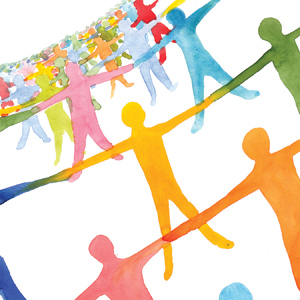According to the African proverb, it takes a village to raise a child. Hillary Rodham Clinton, likely to become the next US Democratic Party presidential candidate, adopted the saying as the title of the 1996 volume that outlined her philosophy. It’s an idea which many Catholics, indeed many Christians, will find appealing, as it reflects a sense of mutual responsibility and solidarity that is at the heart of Christianity.
But where is that village, that place of support and interconnectedness? Many people today feel that the world is a friendless place, where it is hard to make links with others. It is easy to think that we have lost the neighbourliness that previous generations enjoyed.
That might be an overly nostalgic view of the past, but what I have discovered in the last 16 months of treatment for breast cancer is that the village is no longer just a neighbourhood built of brick and stone but a network of people, sometimes stretching right across the globe. And that it takes a village – one of this new kind of village – to sustain a patient through the trauma of serious illness. Indeed, if you are lucky, not one but several networks hold you in their embrace and help you endure.
As I write this, some of my networks are coming to an end. My regular treks to hospital are nearly over. The constant companions – surgeons, radiotherapists, oncologists, nurses and counsellors – will soon wave me on my way, and turn their attention to another nervous, fretting patient, bursting with questions and anxieties, as I was at the beginning. I have just one more treatment to go, and I can’t wait! And yet … I will be sad to bid farewell to the familiar faces, the NHS staff who worked tirelessly to help and reassure me.
The experience has brought home to me the power of Pope Francis’ words about the Church needing to be like a field hospital, a place where people’s wounds are healed. There must be urgent attention to the patient’s immediate needs, but the care has to be for the whole person as well.
A hospital is not just the professional carers. There are the other patients as well. When you have regular treatment, you get to know the people alongside you in the chemotherapy clinic: you hear their stories, their dramas, the blows their plans for adventures in retirement have received. At home, you can easily reassure yourself that everything will be fine, eventually. But in the chemo treatment suite, you face reality: there are people there who are very seriously ill indeed. The village of fellow patients works very effectively. We keep one another’s spirits up in practical ways: moaning about NHS red tape; exchanging tips about wigs and make-up; sharing jokes, often black – particularly about the vampire’s lair in the basement full of our blood samples; making phone calls and sending text messages to let one another know how someone else is doing.
Old hands explain to new arrivals what to do: get an anaesthetic cream so accessing your intravenous line doesn’t hurt was one of the best pieces of advice I received. I’ve met architects, TV producers, retired police officers, website designers, shop assistants: a melting pot of Londoners with origins in countries around the globe. They all seem to have acquired a very British quality: a stiff upper lip. There might have been some tears, but my lasting memory of my fellow patients will be of their quiet stoicism.
Other networks of support have been more conventional but just as vital: the friends and colleagues who call, text, write and email; the family that keeps everyday life going. When I became ill, the attention I received was extraordinary: the local florist’s van became a regular at the door. Life took on a veneer of glamour at a decidedly unglamorous time. Gradually, that attention was replaced by a different kind of attentiveness, a sort of constancy. The monthly letter, the three-weekly phone call. I was utterly amazed that some people took the trouble – they must have marked it in their diaries – to know when my next treatment would be and to check how I was feeling.
If you know someone who is facing a long haul through illness, remember that your concern is needed at the end almost as much as at the beginning. When the flowers have drooped and the basket of fruit is long finished, a patient will be feeling in need of that solicitous call. (Not that every encounter is necessarily helpful. I’ve been told that the only way I will get better is if I take up daily t’ai chi exercise, and assured that chemotherapy will kill me – I need acupuncture instead.)
The biggest village has been The Tablet and the wider Church: readers have been kind; sisters have prayed; priests have offered Masses. This summer, after nine months away, I returned to work. On one occasion, I spoke to a monsignor on the phone, who asked how I was. He happened to call when I was not feeling so good, and I asked that if he had a spare moment, could he say a prayer. “Oh, you’re on the cancer list already,” he said. Goodness! How many lists are there? The pneumonia list? The HIV list? The not-a-cat- in-hell’s-chance list?
Nobody would ever be glad to have been ill. I look back with some nostalgia to the days BC – Before Cancer – at the person I was then, a sort of innocent abroad. But this time AD – After Disease – has brought a renewed optimism for life and for people. One of the dangers of being a journalist, particularly when you have been in this profession for many years, as I have, is that your healthy scepticism about people can sour and turn into cynicism. If that had happened to me, then I can confidently say it has been cut out along with my tumour.
Has the Holy Spirit played a part in all this? At times it seemed likely, or at least there have been remarkable moments of serendipity. One day, exchanging an email with a monk in the same boat as me, and feeling unsteady in my resolve, he sent me an excerpt from St Cyprian in that day’s breviary: “Let us be ready for all that God’s will may bring, with an undivided heart, firm faith and rugged strength. Let us shut out any fear of death, and keep our mind on the immortality that follows death. Let us show that this is what we believe.”
Another of those serendipitous, Holy Spirit moments: at a Tablet event to mark our 175th anniversary, I bumped into the scriptwriter Frank Cottrell Boyce. I started to realise that he didn’t recognise me, though we’ve met a few times. “It’s your new hairstyle,” he said, “that’s why I didn’t realise it was you.” I explained that all my hair fell out through chemo and that when it returned it was quite different from before. The next day Frank emailed me to say he’d prayed for me at Mass that morning. “One of the readings included, ‘Every hair on your head has been counted’,” he wrote. It finished with “Be not afraid” – the words that so resonated with me last Christmas at the start of my journey.
I cannot say that I am completely without fear about the future. But thanks to my villages, I feel ready for the task ahead – and reassured of the love of the Lord.
Catherine Pepinster is one of the contributors to Abounding in Mercy, published by St Pauls to mark the Year of Mercy, and compiled by Mgr Daniel Cronin.
17 December 2015, The Tablet
Standing together
Surviving illness
La douce turns sour
 Loading ...
Loading ...
Get Instant Access
Subscribe to The Tablet for just £7.99
Subscribe today to take advantage of our introductory offers and enjoy 30 days' access for just £7.99





What do you think?
You can post as a subscriber user...
User Comments (0)